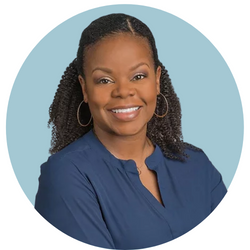
part of Funding The Frontlines: A Roadmap To Supporting Health Equity Through Abortion Access
Provider's Perspective: Commitments Are Measured in Funded Actions
Dear Philanthropy,
Shifting your grantmaking to follow the bold and actionable ask coming from the frontlines of abortion access that the National Committee for Responsive Philanthropy has organized and amplified throughout this roadmap, requires more than good intentions. It demands deliberate, collective action.
While it is obvious that a handful of foundations are committed to advancing health equity and improving women’s health, much of their time, interest, and dollars invested too narrowly define what barriers exist in accessing reproductive and sexual health care. The philanthropic sector’s continued silence about abortion has impacted many people, including transgender and gender expansive abortion seekers, who often bear the brunt of philanthropies inequitable practices. The struggle to contextualize abortion services as part of essential health care services or to center transgender and gender expansive abortion seekers, means many communities are overlooked in their giving.
In 2018, data provided by Funders for LGBTQ issues reported that US-based foundations awarded $28.6 million focused on trans and gender expansive communities. Of that total, less than ¼ ($6.3 million) targeted issues related to health and wellbeing for trans and gender expansive people, and an even smaller amount of money was specified for abortion care..
Author

As a physician committed to providing comprehensive health care and access to abortion services, I know that in addition to direct service provision, this work requires philanthropic dollars to expand beyond the binaries of gender as well.
Protecting the Human Right to an Abortion
As an abortion provider, I know that systems to improve access to abortion care must be designed to be as intersectional as the communities that we serve. Not all people seeking abortion care identify as women. Not all people seeking abortion care identify as heterosexual. Despite this reality, a cisgender heteronormative understanding of abortion care persists, excluding those who may not identify that way from care. To care for all those who need our services, our clinical care and grantmaking practices must reflect the people behind our clinic doors and address the gaps in gender and abortion care that stigma, silence and grantmaking have created.
Abortion access is a human rights issue. Unfortunately, it is not treated or funded in that way. It the only area of health care where funders have allowed bias and ideology to determine their grantees and shape their portfolios. Those failures have not only further contributed to the criminalization of abortion care, but also have created additional barriers to access, especially for abortion seekers who are already marginalized from care.
However, it does not have to be this way.
Abortion providers and those seeking abortion care are uniquely positioned to bring medical evidence, their lived experiences and clarity to the most politicized area of healthcare. In partnership with philanthropic communities, they can be a powerful force in helping to combat the stigma that anti-abortion lawmakers, organizations and systematic barriers have attached to it.
We use our medical expertise and experience caring for our patients to advocate for the right to access abortion care in our communities. As funders, your proximity to power and capital should be used for the same.
Prioritizing Care at the Margins
Our work is only beginning. As physicians, we understand there is still work to be done in our own field. A 2011 study examining medical education curriculum content showed that there was only about 5 hours, on average, of LGBT related educational content among 150 medical schools, with transgender-related topics least addressed. Although there has been some improvement since, the lack of training in medical education persists. Clinicians have identified this as a deficit as well. Studies have shown that clinician knowledge and comfort with care provision for trans and gender expansive patients also found self-identified gaps in knowledge, a lack of confidence, and a lack of experience in providing care to these patients. That is a critical issue when we consider that 1 in 3 transgender people reported having negative experiences when seeing a healthcare provider such as: denial of care, harassment, and significant lack of provider knowledge.
Thankfully, abortion advocates on the frontlines and in clinics are working to change these experiences. It is estimated that currently only 23% of all clinics providing abortion services also provide transgender specific care. With continued support, these numbers can increase. Co-locating abortion care provision with gender inclusive and affirming care helps allow abortion providers and clinics to ensure that they are serving the abortion needs of people with varying gender identities and experiences seeking care.
Health care facilities and individuals that provide abortion care have long sought ways to provide comprehensive reproductive health care to all our patients, including those who experience gender beyond the binary. The professional duty and obligation to help ensure that everyone has the choice to determine their futures, including if and how to become a parent, is a critical tenant of the reproductive justice framework.
Working alongside grassroots leaders, physicians and clinics are trying their hardest to provide clinical care, as well as to provide the education, advocacy and training needed to address the inequities within the medical industrial complex. But we cannot address the many attacks on abortion access, including those that explicitly target or erase transgender specific care, without the unrestricted, unbiased support of foundations.
Now, more than ever, it is time to invest in abortion access that prioritizes care at the margins, increase the amount of trans-focused research and elevate and follows the knowledge of transgender leaders.
Equity – and justice – demands it.
Dr. Jamila Perritt
President and CEO
Physicians for Reproductive Health
Credits:
Graphics Designed by Trevor Messersmith of 80east Design
Website Frame & Submenu by Black Digital Group
A convenient way to get the latest news and resources that help grantmakers maximize the impact on equity and justice
Sign me up for ROUNDUP now